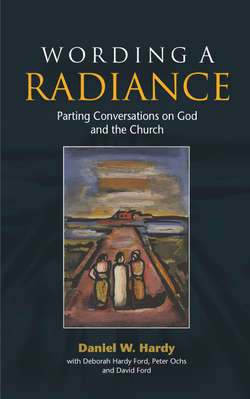Читать книгу Wording a Radiance - Daniel W. Hardy - Страница 6
На сайте Литреса книга снята с продажи.
ОглавлениеPreface
Farewell, farewell! But this I tell
To thee, thou Wedding-Guest!
He prayeth well, who loveth well
Both man and bird and beast.
He prayeth best, who loveth best
All things both great and small;
For the dear God who loveth us,
He made and loveth all.
(Samuel Taylor Coleridge, Rime of the Ancient Mariner)
In one of his last published works, an essay on Coleridge’s Opus Maximum, Daniel W. Hardy reflects on the dynamic of love in these few (his favourite) verses: ‘The scope . . . widens from all that is animate . . . to include everything’; ‘the intensity of love increases from “well” to “best,”’; correlatively, the intensity of prayer increases from ‘well’ to ‘best’; and ‘the greatest intensity of prayer (relationship to God) becomes actual not because of human capacity but because God made and loves both us . . . and all things . . . (accordingly) prayer includes not only loving attentiveness but also the reasoning of that which is made by God’.
The last six months of his life had that quality of intensity: the unprecedented element in which was his experience of being drawn deeper into God’s light and love while on pilgrimage in the Holy Land.
This book draws on three series of conversations, which he sustained during those months with his co-authors: Peter Ochs, his friend; Deborah Ford, his daughter; and David Ford, his son-in-law. Of course there were many others too. It tells the story of his experiences on pilgrimage to the Holy Land just weeks before the diagnosis of an aggressive brain tumour; of his coming to terms with those experiences and his approaching death.
Daniel took this time very seriously and dropped many of the activities and commitments that previously took up his time and energy. There were painful decisions about whom to meet with (giving priority to family, graduate students and a few friends, with whom he was used to having sustained conversation); and one of the most agonizing decisions was to give up on the hope of writing a book on the Church he had contracted with Cambridge University Press, which during its long gestation (going back around 20 years to his time in Durham) had become a lens through which he thought about the whole of theology and society.
Yet the decision was made immeasurably easier by the offer of Peter Ochs to be his interlocutor and scribe for a book that would try to distil the key themes and thought of his ecclesiology, together with the understanding that those regular conversations with Peter would be edited with others into the present volume. Daniel showed massive, deliberate determination in giving high priority to these times and he was able to dictate Chapters 2 to 5 of this book, giving something of what would have been the main thrust of that monograph. The pilgrimage added surprising elements to it, as did his terminal illness. So this book was conceived directly in conversation with him, and he was deeply encouraged to know it would happen.
The problem with the density of the material for this book is that it has been quite a challenge to articulate it in digestible form. It is divided into four sections: Part 1 (Chapter 1) begins with ‘A Portrait of My Father’ by Deborah Hardy Ford and then moves into Daniel’s own voice and the story of his pilgrimage as he told it to her. (Different ‘versions’ of this narrative – as told distinctively to each of the three authors – continue to re-emerge throughout the book.) Part 2 is transcribed and edited by Peter Ochs. Each chapter (2–5) recollects and then reflects theologically on key moments and places during the pilgrimage for Daniel: from the headwaters of the Jordan; to Jericho; to St George’s Cathedral in Jerusalem; and walking through the tunnel under the Temple Mount. In Part 3 (Chapter 6, ‘Living Theology in the Face of Death’), David Ford meditates on the impact of Daniel’s thinking in this book, measured through their conversations both over years of rich collegiality (right back to those culminating in their book Jubilate in 1984) and through the intensification of their last six months. The book closes with Part 4 (Chapter 7, written and edited by Deborah Ford) and Daniel’s ‘Farewell Discourses’: conversations he had with Deborah about his own death and dying in the last weeks and days of his life. There is also an appendix containing a selected bibliography of Daniel’s writings.
It has been an astonishing privilege to be caught up in the spirit and movement of this work. We are indebted to many people in helping this book to come about: first and foremost, of course, Daniel himself. Without him, it would never have begun and we have been endlessly amazed and grateful for the gift he has given: for all we learned through our conversations with him and with one other as he gradually handed it over and entrusted his book to us.
And there are many others who have generously and lovingly supported and sustained us in different ways during the months of its coming to birth: particularly Perrin, Jen, Dan and Chris (Daniel’s wife and children, each of whom had profound conversations with him, but have not had the chance to voice them here); Jack, Ann and Dick (his sister and brothers); Rebecca, Rachel, Amanda, Daniel, Sarah and Matthew (his grandchildren); Vanessa and Elizabeth Ochs; Phyllis Ford; Micheal and Brid O’Siadhail; Gregory Seach; Aref Nayad; Yamina Mermer . . . It is impossible to do justice to everyone here, but we are deeply grateful to each one of them; as well as to Natalie Watson of SCM for her patience and encouragement; and to Emily Rowell for her work on the bibliography of Daniel Hardy’s publications.
